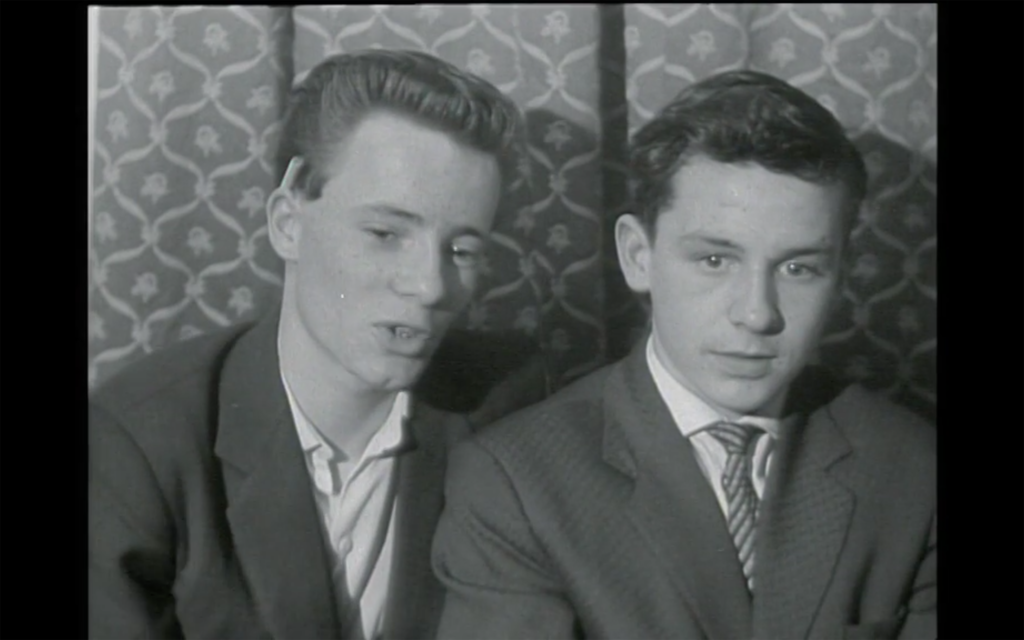
Film Matters: Please tell us about your article that is being published in Film Matters.
Harriet Crisp: “An attitude means a style. A style means an attitude: The Free Cinema Movement in 1950s Britain” considers the relation of Karel Reisz’s We Are the Lambeth Boys’ style and production to the aims set out in the first Free Cinema manifesto. “Free Cinema” refers to a series of programs of documentaries shown at the National Film Theatre between 1956 and 1959 which influenced the British New Wave. The programs were accompanied by striking and somewhat enigmatic manifestos. I was interested in whether the ideas expressed in the manifestos were borne out by the films.
FM: What research and/or methodologies do you incorporate in your ar>cle?
HC: The article combines close textual analysis of We Are the Lambeth Boys with appropriate historical context and critical interpretations. The research process therefore involved reading secondary sources, repeated close viewings of the film, and wider viewing of Free Cinema films.
FM: Describe the original context for/when writing this article while an undergraduate student.
HC: An earlier draft of the article was written for a second year film history unit entitled Film History to 1960. The unit introduced the history of film up to 1960 and covered topics such as European and American silent cinema, Italian Neorealism and 1950s Japanese cinema. I was particularly fascinated by the class dynamics at play in the Free Cinema films screened during the unit and more broadly by the writing of film manifestos, so chose to combine these interests in my final assignment.
FM: How have your personal experiences shaped and influenced your writing?
HC: The main influence on my writing is reading. I read a lot, mainly contemporary fiction, and while it rarely directly relates to my academic work, it definitely shapes how I write.
FM: What aspects of the writing process were most challenging? Why?
HC: For me, the most challenging part of the writing process was understanding elements of the manifesto. Some of it is written in very enigmatic terms and I had to reread it several times and refer to secondary sources to understand the aims that were being set out.
FM: What do you enjoy most about your article?
HC: I am pleased with the structure, organization, and clarity that I achieved in my article. Given the amount and complexity of material I drew on, this was really important.
FM: How has the Film Matters editorial and publication process impacted the development/evolution of your article?
HC: Reviewing the reader reports led me to explain the terms used in my article, draw on more sources, incorporate more images, and include more of my personal thoughts.
FM: What audience do you hope to reach with your Film Matters article and/or what impact do you hope it has on the field of film studies?
HC: I hope to reach an audience that is unfamiliar with the Free Cinema movement and curious to watch some of the films after reading my article. Some of these films are incredibly beautiful and intriguing.
FM: How has your department and/or institution supported your work in film and media?
HC: The Film and Television department at the University of Bristol has provided me with exceptional teaching. The units and assignments are designed with flexibility so students are able to pursue their own research interests and an interdisciplinary approach is encouraged. The combination of historical and theoretical scholarship alongside practical filmmaking work offered by the BA is brilliant. The more traditional, academic work improves filmmaking work, and vice versa.
FM: How has your faculty mentor fostered your advancement as a film scholar?
HC: Dr. Alex Clayton taught me in my first and second years as well as being my personal tutor throughout the BA. Alex is always willing to discuss ideas for essays and filmmaking projects and helped me consider postgraduate study options.
FM: What advice do you have for undergraduate film and media scholars?
HC: My advice for undergraduate film and media scholars would be to watch and read as much and as broadly as you can. I would also advise revisiting and reworking essays and practical work after receiving feedback as this will allow you to truly hone your craft.
FM: What are your future plans?
HC: I’m currently pursuing a master’s degree in Contemporary Art and Archaeology at the University of the Highlands and Islands, volunteering at the Cube Microplex, and working as a visitor assistant at my local museum. After completing my master’s, I hope to undertake a practice-based PhD and/or work in museums and cultural heritage.
Author Biography
Harriet Crisp is a filmmaker and recent graduate of the University of Bristol. Her interests include documentary, essay and experimental film, and film and archaeology. She is currently pursuing an MA in Contemporary Art and Archaeology at the University of the Highlands and Islands.







































